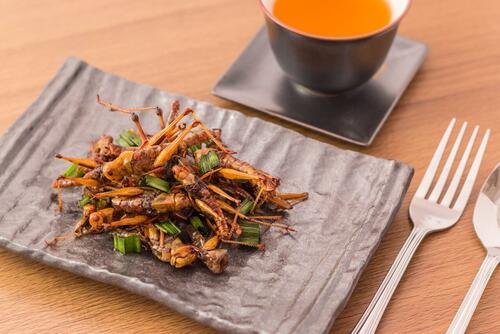Authored by Kit Knightly via Off-Guardian.org,
Sometimes it feels like writing for OffG has fallen into a recognizable pattern the last two years, one that could be best summed up “as ignoring the (mostly) fake stuff on the front pages and collating the real stuff on the back”.
Regular reminders that no matter who you vote for, or which side wins what war, the overarching agenda is still out there, eating and growing. Like the Blob or the Thing.
-
Censorship? We all know that’s on the elite’s shopping list.
-
Digital currencies? They’re still going.
-
Digital ID? Absolutely on the cards.
And we’ll be returning to talk about all of them no doubt until they eats any more or we’re finally shut down (whichever happens first)
But today we’re talking about eating the bugs.
Not just the bugs though – goo too.
Everything in fact that academics and journalists have decided to group under the umbrella term “alternative protein” in headlines like this one, from Sky News:
Are alternative proteins going mainstream? This multimillion pound new project hopes so
This story is in response to the launch of the UK’s new National Alternative Protein Innovation Centre (NAPIC), a £38million research project co-founded with Imperial College London (of Covid modelling fame).
Professor Karen Polizzi of Imperial’s brand new “Bezos Centre for Sustainable Protein” (yes, that Bezos) described the new initiative thus:
Transitioning to healthy, sustainable sources of protein is a pressing global challenge. The National Alternative Protein Innovation Centre will help facilitate this transition by supporting researchers and industry in all parts of the process from product design through to consumer acceptance. At Imperial, we will focus on developing economical, sustainable processes for producing newly discovered alternative proteins on a large scale.”
The “alternative proteins” that are the focus of this research being…
edible proteins that are derived from sources other than animal agriculture: from plants such as cereals, legumes, tubers and nuts; fungi such as mushrooms; algae such as seaweed; insects; proteins derived via lab-grown microbial cells or fermentation; and lab-grown meat
Like I said: bugs and goo – oh and some plants too.
What exactly is the appeal of the bugs and the goo (and plants) as far as the overlords go?
That’s a complex question, with a multi-faceted answer.
Part of me thinks they just like to see ordinary people humiliate themselves in the “I think we could get them to brush their tongues” model. But that’s just a theory, we can expound upon it another time.
Outside of sadism and other psycho-social motivations there are practical questions of profit and control. As we covered in our recent piece on genetically modified gene-edited food, intellectual property laws play a role.
An egg is an egg. Beef is beef. You can’t patent a cow or a chicken, and it’s quite difficult to prevent people keeping their own animals.
But when your product is a few thousand freeze-dried crickets ground into a powder (including their eyes, intestines and faeces), mixed with chemical preservatives, thickeners and artificial flavourings to mimic real meat…
well, you can patent the hell out of that.
That’s part of the reason the edible insect market is expected to grow to ten times its current size in the next decade.
In one of those ever-so-timely coincidences, the announcement of the new research project has just so happened to accompany a full-court press on “alternative protein” propaganda.
Last week The Guardian ran a glossy advertisement interview with the CEO of Meatly, the lab grown meat company, where he claimed “Cultivated meat is safer, kinder, more sustainable”
The very next day The Guardian (again) reported on a “new study” that (shockingly) found “Plant-based meat alternatives are eco-friendlier and mostly healthier”.
Four days ago, another new study found proteins extracted from peanut shells could be used to supplement animal proteins.
Good Food Magazine thinks eating mealworms can cure diabetes. Medical journals are publishing pieces “investigating the health benefits of alternative proteins”
MSN is reposting articles from the Metro headlining: “Lab-grown meat is coming. Here’s why you might have no choice but to eat it”
Yahoo Finance tells us “Why Lab-grown meat is a win for the UK’s investment industry”
And it’s not just the UK. Obviously. It never is, just like prices don’t change at just one Walmart and the menu doesn’t change at just one MacDonald’s. Because globalism is already a reality, and your “national government” is just a local branch of a multinational conglomerate.
In the US, the University of California is being pretty straightforward:
Good grub — why you should consider eating bugs
While Finland’s “Solein” company, which makes bacteria pancakes out of “air and sunlight”, has been “Generally Recognised as Safe” by the FDA (the next step, I suppose, would be being “generally recognised as food“).
Australia’s “next superfood” is Hoppa, a bag of powdered crickets. Next month, Melbourne will be playing host to AltProtein24, a conference for the promotion of “alternative proteins”.
Last week Singapore approved 16 different types of insects for human consumption. Singapore is also getting its own “Sustainable Protein Research Centre”, again funded by huge donations from Jeff Bezos.
The silver lining here is that, despite all these efforts, there’s a good possibility this will never work. Article after article highlights the problems of “consumer acceptance” or “public enthusiasm” or similar phrases meaning the same thing:
Most people don’t want to eat bugs.
Hence the propaganda, I suppose.
I want to close by pointing out the truly hilarious modern irony of the story.
The same outlets that are happily promoting the fact the elites want us to eat bugs and goo:
Are simultaneously calling it a crazy “conspiracy theory”:
We are quite literally in the age of doublethink.
But never mind, we’ll be OK as long as we keep refusing to eat ze bugs…or ze goo.
